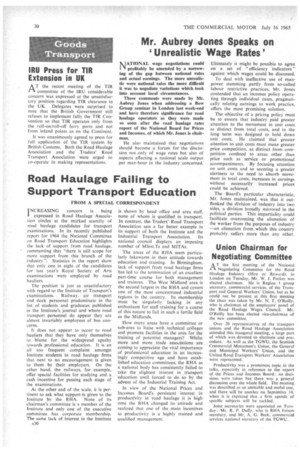Mr. Aubrey Jones Speaks on Unrealistic Wage Rates '
Page 32

If you've noticed an error in this article please click here to report it so we can fix it.
NATIONAL wage negotiations could profitably be amended by a narrowing of the gap between national rates and actual earnings. The more unrealistic were national rates the more difficult it was to negotiate variations which took into account local circumstances.
These comments were made by Mr. Aubrey Jones when addressing a Bow Group seminar in London last week-end and have therefore significance for road haulage operators as they were made so soon after the road haulage rates report of the National Board for Prices and Incomes, of which Mr. Jones is chairman.
He also maintained that negotiations should become a forum for the discussion not only of wage rates but also of aspects affecting a national scale output per man-hour in the industry concerned. Ultimately it might be possible to agree on a set of "efficiency indicators" against which wages could be discussed.
To deal with ineffective use of manpower stemming partly from so-called labour restrictive practices, Mr. Jones contended that an incomes policy operating through individual cases, pragmatically relating earnings to work practice, offers the most promising solution.
The objective of a pricing policy must be to ensure that industry paid greater attention to the movement in unit costs as distinct from total costs, and in the long term was designed to hold down unit costs. He claimed that greater attention to unit costs must mean greater price competition, as distinct from competition confined to areas other than price such as service or promotional accompaniments. By focusing attention on unit costs and so securing a greater alertness to the need to absorb movement in total costs, increases in earnings without necessarily increased prices could be achieved.
The -Board's particular characteristic, Mr. Jones maintained, was that it outflanked the division of industry into two sides, a division broadly mirrored in the political parties. This impartiality could facilitate overcoming the alienation of the worker from the purposes of industry —an alienation from which this country probably suffers more than any other.




























































































































